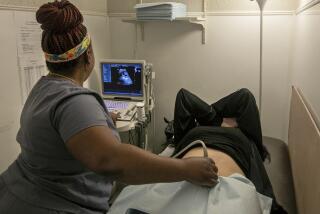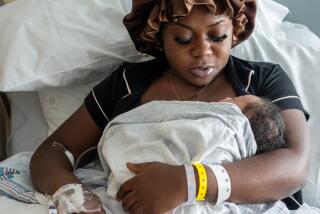Mothers Stalk Silent Killer : Parenting: Undetected, a little-known bacterial infection carried by a woman can cause death or disability to her fetus or newborn. Some adults who learned the hard way are trying to spread a warning.
- Share via
As a nurse, Cindy Coe was more aware than the average person of what she needed to do when she was pregnant to protect her unborn child’s health.
“I did everything right,” the Yorba Linda resident says emphatically.
But something went terribly wrong just two hours after the birth of her second son, Sean. He became gravely ill as a result of a bacterial infection that quickly spread throughout his body.
He went into shock, his kidneys shut down, and he suffered a brain hemorrhage. With the help of a blood transfusion that finally enabled him to fight off the infection, Sean survived. But the illness left him severely disabled, mentally and physically.
“He’s totally dependent, and chances are great that he always will be,” says Coe, 37, a mother of three.
It’s been seven years since Sean was born, but it’s still difficult for Coe to talk about what happened because, she explains, even though she knew intellectually that she’d done nothing to endanger her baby, “I did a great job of blaming myself.”
Although she had no symptoms, Coe was a carrier of the bacteria that caused Sean to become so sick.
“I felt I had done it to him. I kept thinking his damage was because of something in my body that made him sick, and how could I have allowed that?”
Coe’s guilt has been eased, but not erased, by the passage of time. She struggles with the feeling that, with her nursing training and experience, she should have been more aware of the dangers of the bacterial infection that proved so devastating to her son, who has cerebral palsy and, developmentally, has not progressed beyond the level of a 2-year-old.
Sean is a victim of Group B streptococcus (GBS), a little-known cousin of the Group A strep bacteria that killed Muppet creator Jim Henson.
GBS afflicts an estimated 12,000 infants in the United States each year, killing 2,000 and leaving many others with physical and mental disabilities.
Before Sean was born, Coe had heard of GBS and knew it could be deadly, but she’d seldom come across it in her work as a nurse. “It’s something I never even thought about with my own pregnancy,” she says.
Imagining how Sean’s life might be different if she’d known she was a GBS carrier before he was born is “like having someone stick me in the heart with a knife,” she says.
The fact that, in spite of her professional training, Coe went through her pregnancy without discussing GBS with her doctor illustrates the challenge facing the Group B Strep Assn. based in Chapel Hill, N.C.
*
Gina Burns, who founded the association after losing a newborn son to GBS about two years ago, points out that, in many cases, parents don’t find out what Group B strep is until it’s too late to protect their child from infection.
The guilt that has plagued Coe is common among parents who have suffered a loss related to GBS infection, Burns says. When they begin asking questions, they often discover that there may have been a way to avoid tragedy.
“The grief in many cases turns to anger once parents find out that a Group B strep infection could have been prevented,” Burns says.
The Group B Strep Assn. gives parents an outlet for their anger and grief by involving them in a nationwide education campaign.
“Knowing we’ve been able to prevent other people from going through this has helped me heal,” Burns says.
*
Participating in the educational campaign also has been therapeutic for Karen Hanson, 36, a Fountain Valley resident who is organizing a support group in Orange County for parents whose babies were victims of GBS infections.
(Those interested in joining should call (714) 979-7059. For more information on GBS, send a self-addressed, stamped envelope to the Group B Strep Assn., PO Box 16515, Chapel Hill, N.C. 27516.)
Hanson, who will be attending the association’s national strategy meeting Oct. 11 at the Residence Inn in Fountain Valley, wants to spare other parents the grief she went through when a child she had carried for nearly six months died in the womb of pneumonia as a result of GBS.
She wants parents to know the basic facts presented in the association’s literature, which points out that:
* GBS is the leading cause of life-threatening infections in newborn babies.
* Most GBS infections are acquired during childbirth when the baby comes into direct contact with the bacteria carried by the mother, but they also can be a threat during pregnancy.
* GBS usually causes infant illness within the first seven days of life, but infections may occur up to 2 months of age.
* Most babies who come in contact with the bacteria do not get sick. However, those who become ill may die within hours or days, and those who survive infection may suffer permanent brain damage, usually as a result of meningitis.
* As many as 35% of all pregnant women are carriers of GBS but have no symptoms. With prenatal testing and antibiotic treatment, carriers can be identified and many babies can be protected from infection.
*
Hanson--whose healthy 2-year-old son never became infected with GBS, perhaps because he received antibiotics as a precaution immediately after his premature birth--believes she might not have lost a baby to GBS if she’d been tested early in her pregnancy.
She has joined the Group B Strep Assn. in lobbying obstetricians to make GBS screening a routine part of prenatal care.
Coe also has become an outspoken advocate of routine testing. She declares: “Moms ought to demand it . . . .. If they don’t get it, they should go to another doctor. It’s not worth losing a baby. Why wait to see a mom lose a child or have one who is severely handicapped before deciding to watch for it?”
According to a technical bulletin released in July by the American College of Obstetricians and Gynecologists, there is no standard procedure for GBS screening, which usually involves a simple vaginal swab, so it is up to each doctor to decide when--or if--a culture should be taken.
There is widespread disagreement among doctors about whether GBS cultures should be taken routinely because tests often prove unreliable.
For example, a woman who shows no sign of bacteria early in her pregnancy may test positive when she goes into labor, while a woman who tests positive initially may be free of the bacteria at the time of delivery. The margin for error is great enough that some doctors fear routine screening would lead to costly, unnecessary treatment on a large scale.
*
There is also controversy over the best way to treat GBS when a test proves positive, because the use of antibiotics during pregnancy or labor is not always effective and may cause complications.
However, the American College of Obstetricians and Gynecologists does recommend that GBS carriers with certain risk factors be given antibiotics intravenously during labor. That includes women who have premature labor, whose amniotic fluid breaks 12 hours or more before labor begins, who have a fever before or during labor or who have previously given birth to a child infected with GBS.
Although there is no established protocol for GBS screening, some doctors already are doing just what the Group B Strep Assn. is hoping will become standard. Among them is Dr. Abraham Han, a Whittier obstetrician-gynecologist who has been screening routinely for GBS since he started his practice four years ago.
Han says he cultures all of his patients during their first pregnancy visit and repeats the GBS test at 36 weeks. Those who test positive are given antibiotics during labor to protect the baby from infection.
Han acknowledges that the tests aren’t foolproof. However, he says: “Medicine is an art, not a 100% science. You can’t say who is right or who is wrong. Because of the prevalence of carriers of Group B strep, I believe it’s really worthwhile to do the screening. If one baby benefits from it, it’s worth it.”
*
Karen Hanson has been collecting success stories as part of her lobbying effort for routine screening. One involves Cathleen Hart, 33, of Laguna Beach.
Hart says she had never heard of GBS when she first became pregnant, but her doctor had seen babies die of infection and was a firm believer in routine testing.
Hart had no symptoms of GBS, but repeated tests during her first pregnancy proved positive. She took antibiotics intravenously during labor and delivery with each of her three children, and none of them became infected with GBS.
Hart feels lucky that her obstetrician tested her for GBS. “I wouldn’t have known to ask about it. I had to trust my doctor,” she says.
Cindy Upchurch, 36, a Mission Viejo resident who lost a son after she began having flu-like symptoms caused by GBS seven months into her first pregnancy, wishes her doctor had tested her before her symptoms appeared. The infection in her body was not detected until she was so sick that it became necessary to induce labor prematurely.
Her son, who weighed 2 pounds, 3 ounces at birth, didn’t get GBS, but his lungs were immature, and he was able to survive in the intensive care unit for only three weeks.
Upchurch made sure she was cultured for GBS during her next two pregnancies and took antibiotics as a precaution, even though the tests were negative. She has two healthy daughters.
She points out that it’s especially important for expectant parents who have lost a child to GBS to find a doctor who will take the time to listen to their concerns and explain their options regarding testing and treatment.
Coe, who took antibiotics during her third pregnancy and delivered a healthy baby, agrees. “Not enough doctors are making Group B strep part of their routine discussion about pregnancy,” she says. “It’s up to us to speak up.”
More to Read
Sign up for Essential California
The most important California stories and recommendations in your inbox every morning.
You may occasionally receive promotional content from the Los Angeles Times.













